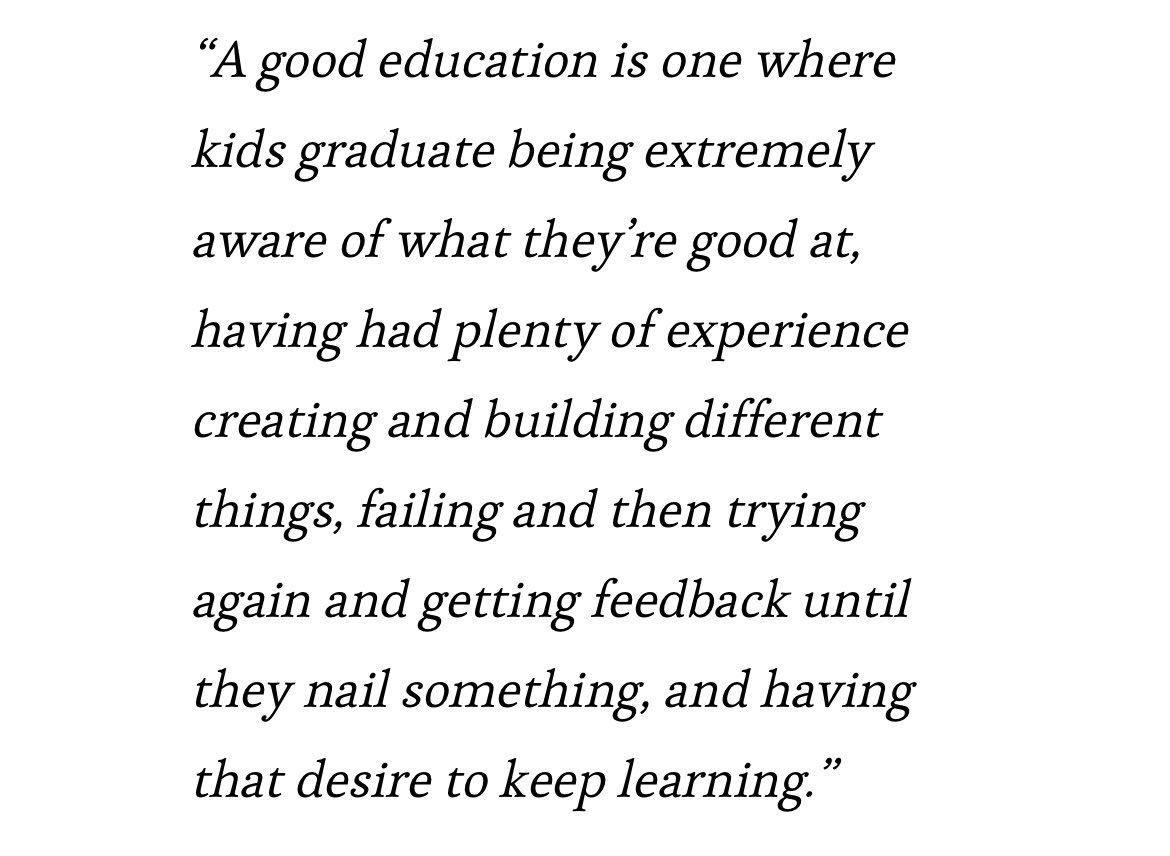
In school we learn to play the status game, the grades game, the compliance game... These games may help us “win” the game of school, but won’t get us far in real life. To succeed in life, whatever that means to us, we need to master a different game... The *METAGAME* 👇🏼🧵
The "school" I envision doesn't use games to teach kids. The school I envision *is* a game. From beginning to end.
Studies shows that when we go to sleep, our brain focuses on the most salient problem it was recently trying to solve. So if we want kids to retain what they “study" better, they should play video games first, then study before going to 💤 Reverse the order: First 🎮 then 📚

2.3 billion people play 🎮 games regularly. Those who understand the power and potential of games will be the ones who shape our future. 5 takeaways from a conversation between @shaneaparrish and @avantgame 👇🏼 podcasts.apple.com/us/podcast/101…

Schools frame "success" as a straight line. This sets kids up for disappointment and unrealistic expectations. Success in real life looks more like a squiggly line, with multiple ups and downs: Invent, launch, reinvent, relaunch. Start over. Repeat again and again. ➿ > ➖

Finding work that you enjoy is a shortcut to achieving your desired outcomes.

How can we help kids become more independent-minded and why does it matter? 3 ideas from @paulg that apply to kids 👇🏼

The only sustainable answer to the challenge we face in education today: Diversity of approaches.

Neat idea by @AdamMGrant: Don’t set rules, set values. Rules set limits that teach us to adopt a fixed view of the world. Values encourage us to internalize principles for ourselves. Instead of demanding attention, try talking to kids about why it’s important to listen.

The future of assessment is not scores. It’ll be proving that you have the skills and creativity to solve problems in new ways.
Have a dilemma? Ask kids for advice. "I'm feeling nervous about my presentation tomorrow, any tips?" This shows we have confidence in them to handle these kinds of challenges. Next time they face a similar situation, they'll know that they can rely on themselves.

For moral behaviors, try nouns > verbs. Instead of “that was so generous” try “YOU are so generous” "When our actions become a reflection of our character, we lean more heavily toward the moral and generous choices. Over time it can become part of us." — @AdamMGrant

Don’t praise the action. Praise the *character* behind the action. Research shows we get a 22-29% increase in how likely kids are to help if we say "thanks for being a helper" instead of "thanks for helping." Kids want to *earn* that identity. 👇🏼

We’re building the antidote for modern schooling. Here’s what makes Synthesis unique👇🏼

Kids contribute to team discussions in ways that feel authentic to them—be it leading, following, or disagreeing. They try and they fail, and their decisions are never perfect. But they surely get the chance to contribute to consequential decisions *in their own way.*

We are proud of what makes us different. In my next thread, I'll walk you through the recipe components behind the Synthesis Experience... ...or how we “teach.” Join the club 👇🏼🤸🏼♀️ synthesis.is
“If knowledge is power, knowing what we don’t know is wisdom” —@AdamMGrant Schools should teach kids to be curious, not afraid, about what they don’t know.

Because learning can and *should* feel like playing a fun game 🤸🏽♀️ Thanks for having me on your podcast @bzaidi pic.twitter.com/XZIboru60O

Who’s more impressive? The kid who knows the right answer, or the kid who doesn’t but figures it out?

A good teacher introduces new ideas. A great one introduces new ways of thinking.
Schools should focus less on “being right” and more on building the skills to consider different perspectives and argue productively about them.
Teach kids to think like fact-checkers: 1. Interrogate information instead of simply consuming it 🔎 2. Reject rank and popularity as a proxy for reliability 🙅🏽♀️ 3. Understand that the sender of information is often not its source 🤔 From Think Again by @AdamMGrant

What you know and what you think matters less than how you know and how you think. School taught you otherwise.
Kids are natural creators. The problem is that schools limit their creativity by giving them a bunch of guidelines and parameters that tell them what the final product should look like. But when you see them in the right setting... 🤯🤯

Here’s what I’ve noticed: Kids who think like scientists are more comfortable admitting they were wrong. You hear them say things like “my strategy was bad, let me rethink my approach” or “my hypothesis was wrong, let me pivot” In scientists mode, kids gain mental agility.

In school we learn to search for reasons why we must be right. Perhaps we would learn more if we searched for reasons why we might be wrong and revise our views based on what we learn.

Best definition of education I’ve ever seen. By @anafabrega11 via @BleeckerCharlie pic.twitter.com/tojuHlKB1f

My favorite analogy for mental models: “If you think of your brain as the operating system, mental models are the different apps that you can install to give you functionality and to improve your decision making.” @george__mack

Our first simulations expose kids to “adult” concepts like revenue, profit, Dutch Auctions, wormholes, and headquarters, to name a few. We ask parents to keep an eye out for their kid’s improved vocabulary as they move through 🤸🏼♀️ youtu.be/3ge6W3NvWog

At Synthesis, we don’t design for content. We design for experience. What goes into the design of a Synthesis Experience? What are kids learning?👇🏼🧵











